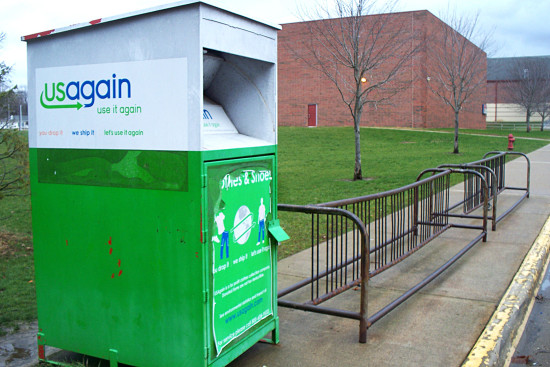The steel bins are innocuously, innocently tucked into corners of parking lots, silently pleading for donations slipped into flip-down doors. But contributions to these bins may not help the needy as much as people assume. In fact, the donations are more likely to boost the bottom line of for-profit corporations since many such collection boxes are operated by companies that sell the donated material, usually to foreign markets.
One of the largest such for-profit enterprises is USAgain, which has about 10,000 bins in 17 states, and 10 in metro Peoria. Based in West Chicago, Ill., USAgain reportedly collects about 30,000 tons of shoes, clothes and various textiles a year
Such companies make money by bundling clothes and then selling them in bulk to recycling companies that export them, where they’re re-sold as apparel, turned into rags, or repurposed as insulation or padding for furniture.
It’s not illegal to collect donated goods and resell it for a profit. But USAgain has also been tied to a shadowy Danish group, known as Tvind or the Teachers Group. Investigative reporters from KIRO-TV 7 in Seattle and other news teams have reported the group is being prosecuted for fraud and other charges by authorities in Denmark, where officials allege it is a multimillion-dollar global business misrepresenting itself as a humanitarian group.
But more importantly, USAgain’s collections hurt donations to local agencies that use donations to fund their operations. Besides the Salvation Army and Goodwill, Peoria has a program that not only accepts donations of clothes and shoes, but gives them away: Dream Center Peoria, a mission of Riverside Community Church.
“We are the only place in town that offers free clothing,” says Matt Larson, executive director at Dream Center Peoria (DCP). “A lot of people face difficult choices – ‘should I buy food or a shirt for my kid?’ – and a lot can’t afford to even pay $7 for a shirt from Goodwill.”
DCP’s HOPE Store gathers clothing and other household items that have been donated to them for free and, in turn, distributes them to the needy for free. The store is open from 9 a.m.-noon on the first Thursday and the third Saturday each month, and helps in emergencies like evictions and house fires.
“We’ve been doing this more than five years – maybe a decade – and we get 70, 80 people every day we’re open,” Larson says. “It’s run like a store. People line up early, sometimes the night before, and we let so many people in at a time, they get 30 minutes to shop, and when they ‘check out’ – it’s free.”
Commercial clothing recyclers have argued that they help prevent unwanted clothing from winding up in landfills. However, many people may prefer their donations help their community.
The growth of collection bins has resulted in some communities trying to control them, citing concerns like some boxes placed in locations without property owners’ permission, or untidy areas where boxes weren’t promptly emptied. In Illinois, Cicero and St. Charles regulate them, and Schaumburg prohibits them. Larson is not advocating that but hopes people become not just “smart shoppers,” but smart donors.
“Whatever’s collected in bins doesn’t come here,” Larson says, “and it’s not given out here, in Peoria.
“I’m not opposed to helping others in other co

PHOTO BY BILL KNIGHT
USAgain has a collection bin on the west side of Peoria Heights Grade School.
untries,” he adds. “At the same time, we’re really still in a recession, a difficult time. When your house’s budget is in ruins, it’s difficult to help anybody else.
“I hope people would at least think about splitting up their donations,” Larson continues, “so some sells maybe, but some is given out to people.”
DCP’s HOPE Store accepts donations from 9-noon Tuesday and Thursdays. Located at 714 Hamilton Blvd.; telephone 676-3000.

Recent Comments